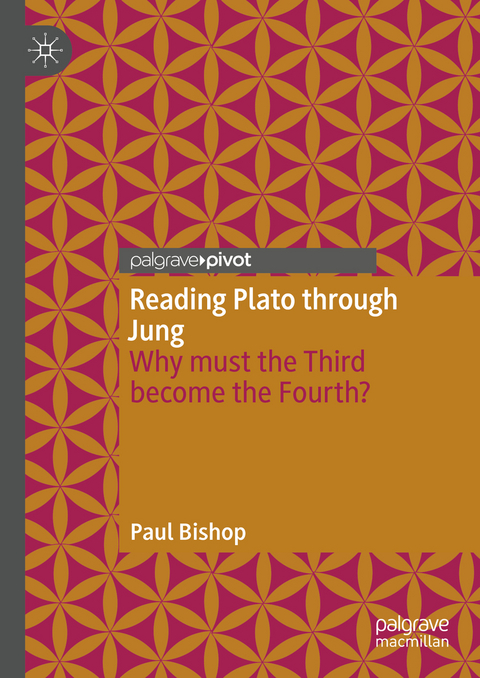
Reading Plato through Jung
Why must the Third become the Fourth?
Seiten
2023
|
1st ed. 2022
Springer International Publishing (Verlag)
978-3-031-16811-6 (ISBN)
Springer International Publishing (Verlag)
978-3-031-16811-6 (ISBN)
This book examines the Jungian imperative that the Third must become the Fourth through the lens of Carl Jung's complex reception of Plato. While in psychoanalytic discourse the Third is typically viewed as an agent that brings about healing, the author highlights that, in the case of Jung, an early emphasis on the Third as the "transcendent function" gave way to an increasing insistence on the importance of the Fourth. And yet, he asks, why must "the Third become the Fourth"?
Paul Bishop begins with a survey of work on Jung's relation to Plato, before turning to Jung's readings of the Timaeus and Black Books, as well as Goethe's Faust II and Nietzsche's Zarathustra. He proceeds to unpick Jung's statements on the Third and the Fourth though a compelling analysis of how Jung draws upon religious and alchemical traditions, Pythagorean numerology, his own dream-like experiences and Plato's cosmology. This book will appeal to practitioners and to scholars working in the history of ideas, psychoanalysis, philosophy, and psychoanalytic theory.
Paul Bishop begins with a survey of work on Jung's relation to Plato, before turning to Jung's readings of the Timaeus and Black Books, as well as Goethe's Faust II and Nietzsche's Zarathustra. He proceeds to unpick Jung's statements on the Third and the Fourth though a compelling analysis of how Jung draws upon religious and alchemical traditions, Pythagorean numerology, his own dream-like experiences and Plato's cosmology. This book will appeal to practitioners and to scholars working in the history of ideas, psychoanalysis, philosophy, and psychoanalytic theory.
lt;b>Paul Bishop is William Jacks Chair of Modern Languages at the University of Glasgow, UK. His previous publications include Carl Jung (2014), Ludwig Klages and the Philosophy of Life: A Vitalist Toolkit (2018), German Political Thought and the Discourse of Platonism (2019), and Nietzsche's "The Anti-Christ": A Critical Introduction and Guide (2022).
Chapter 1: Introduction: Psychoanalysis and the Problem of the Third and the Fourth.- Chapter 2: Jung's Reading of Plato and the Timaeus.- Chapter 3: Jung on the doctrine of the Trinity.- Chapter 4: The Timaeus and Cosmology; the Third and the Fourth in Alchemy and Synchronicity.- Chapter 5: Conclusion.
| Erscheinungsdatum | 23.01.2023 |
|---|---|
| Zusatzinfo | XI, 155 p. 8 illus. |
| Verlagsort | Cham |
| Sprache | englisch |
| Maße | 148 x 210 mm |
| Gewicht | 323 g |
| Themenwelt | Geisteswissenschaften ► Psychologie ► Psychoanalyse / Tiefenpsychologie |
| Schlagworte | allegory of the cave • Depth Psychology • Gerhard Dorrn • German Literature • Goethe's Faust • Goethe’s Faust • Jungian psychoanalysis • Jung's Black Books • Mysterium coniunctionis • Nietzsche's Zarathustra • Nietzsche’s Zarathustra • Philosophy of mind • Platonic Riddles • Plato's Cosmology • Plato’s Cosmology • Plato's Timaeus • Plotinus • Pythagoras • synchronicity • the Fourth • the Third • Transformations and Symbols of the Libido • World Soul |
| ISBN-10 | 3-031-16811-9 / 3031168119 |
| ISBN-13 | 978-3-031-16811-6 / 9783031168116 |
| Zustand | Neuware |
| Haben Sie eine Frage zum Produkt? |
Mehr entdecken
aus dem Bereich
aus dem Bereich
Grundlagen, Behandlungstechnik und Anwendung
Buch | Softcover (2022)
Kohlhammer (Verlag)
35,00 €
den Stand der Traumaverarbeitung erkennen und Behandlungsschritte …
Buch | Hardcover (2023)
Klett-Cotta (Verlag)
36,00 €
vom Mythos zur Psychoanalyse des Selbst
Buch | Softcover (2023)
Kohlhammer (Verlag)
28,00 €


